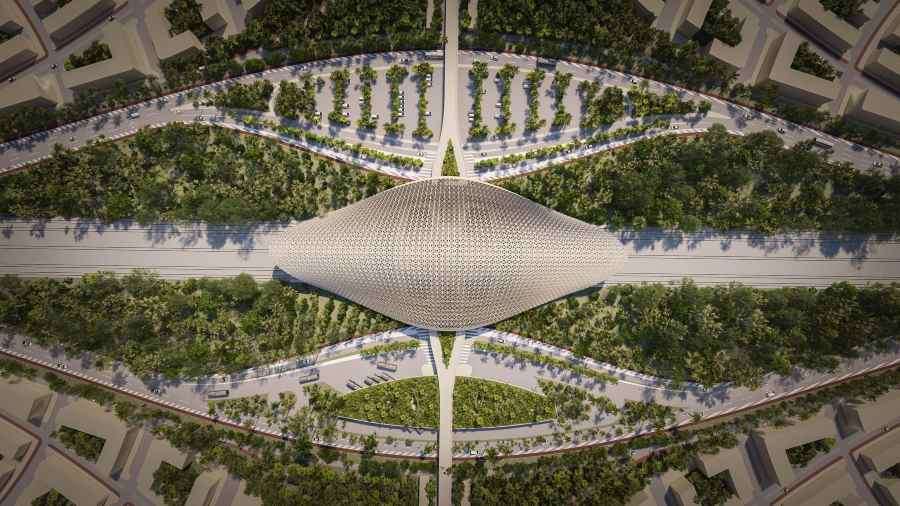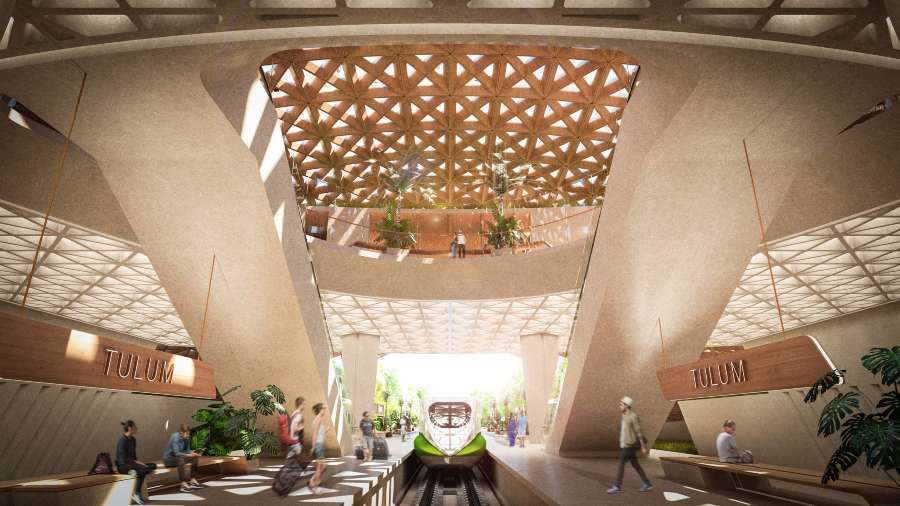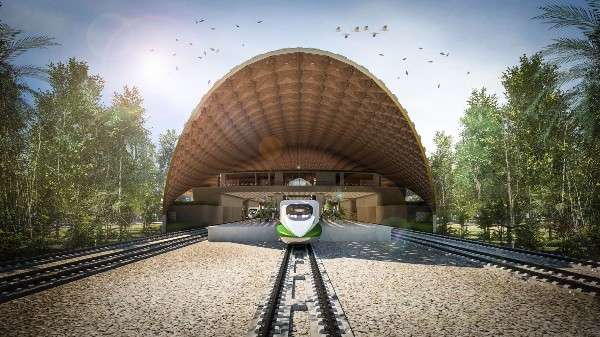Huge Supply of Water is Saved From Evaporation When Solar Panels Are Built Over Canals
If mounted above irrigation canals, the shade of solar panels would reduce evaporation by 63 billion gallons, while generating clean energy.

The ancient Maya civilization was enshrining its legacy in stone more than a thousand years ago, and the ingenious designs from that time are being utilized in fresh ways today.
On a 950-mile (1,525 -kilometer) Mexican railway line, a new station to service the Yucatán town of Tulum is being built using techniques right out of the ancient Maya playbook.

The Mexican-English architecture studio Aidia commissioned for the project came up with a giant sloping eyeball-shaped train roof, and a platform with a lattice-work ceiling that lets air in but keeps rain out, inspired by Mayan building methods.
A perforated roof of structured steel and fiber glass-reinforced concrete panels will line a geometric grid. It'll be glazed in some places and fitted with polished hardwoods in the interior.
"The climate in the Yucatan peninsula is tropical with rain and high humidity in the summer, to deal with this extreme weather, we envisaged a large open lattice roof, glazed in strategic locations, enabling public semi-open spaces that function without mechanical ventilation," wrote the designers on the project site.

"The sunlight piercing through the roof, projects complex geometric patterns on the walls and floors of the station, a play of lights and shadows traveling throughout the space and evoking different sensations on the users," they added.
Indeed the Maya loved playing with shadows, and the light from the sun and the shadow it casts often performed functions on their buildings such as at Chichen Itza, where the spring equinox casts the shadow of a serpent slithering down the side of the Pyramid of Kukulcan.

The train station is designed to bring sustainability and a low-carbon footprint to the fold, so the lack of mechanized ventilation eliminates some emissions, while the surrounding area is cloaked in trees and foliage.
"The aerodynamic geometry of the roof sucks the ocean breeze in and funnels it through the station," writes the studio.
On a 950-mile (1,525 -kilometer) Mexican railway line, a new station to service the Yucatán town of Tulum is being built using techniques right out of the ancient Maya playbook.

The Mexican-English architecture studio Aidia commissioned for the project came up with a giant sloping eyeball-shaped train roof, and a platform with a lattice-work ceiling that lets air in but keeps rain out, inspired by Mayan building methods.
A perforated roof of structured steel and fiber glass-reinforced concrete panels will line a geometric grid. It'll be glazed in some places and fitted with polished hardwoods in the interior.
"The climate in the Yucatan peninsula is tropical with rain and high humidity in the summer, to deal with this extreme weather, we envisaged a large open lattice roof, glazed in strategic locations, enabling public semi-open spaces that function without mechanical ventilation," wrote the designers on the project site.

"The sunlight piercing through the roof, projects complex geometric patterns on the walls and floors of the station, a play of lights and shadows traveling throughout the space and evoking different sensations on the users," they added.
Indeed the Maya loved playing with shadows, and the light from the sun and the shadow it casts often performed functions on their buildings such as at Chichen Itza, where the spring equinox casts the shadow of a serpent slithering down the side of the Pyramid of Kukulcan.

The train station is designed to bring sustainability and a low-carbon footprint to the fold, so the lack of mechanized ventilation eliminates some emissions, while the surrounding area is cloaked in trees and foliage.
"The aerodynamic geometry of the roof sucks the ocean breeze in and funnels it through the station," writes the studio.
"Throughout the design journey, we aimed to infuse the station with some of the best-known features of Mayan Architecture; symmetry, monumentality, geometrical alignment, and the use of limestone are all constant treats in Mayan architecture. As such we have attempted to honor this heritage by rescuing that same spatial quality just reinterpreted it in a contemporary way."
Set to begin construction in six months, the firm hopes the station is finished for the Tren Maya railway line—which connects Palenque, another famous Mayan city, with Cancun—by 2023.
SHARE This Grand Design From the Yucatán With Friends on Social Media…
Be the first to comment